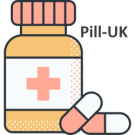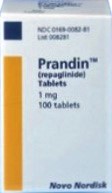Do you have high blood glucose levels? See your doctor immediately. It could be a sign of diabetes. Diabetes mellitus is a disease that causes chronically high blood glucose levels due to a lack of insulin. The consequences of the disease can lead to metabolic disorders, damage to blood vessels, the nervous system and other organs. In addition to non-drug therapies, drugs are often prescribed to lower blood glucose levels and increase insulin production in the blood. One such drug is Prandin, a well-known hypoglycaemic drug in United Kingdom. We discuss it in our material.
We recommend you to buy it in our online pharmacy, because here you will find only quality products from official manufacturers at the best prices, fast delivery to any region of the country and the unique opportunity to order a medicine without a prescription.
What is Prandin
Prandin is an effective treatment for type 2 diabetes that helps control blood sugar levels as an adjunctive therapy, along with a specific hypoglycaemic diet and special exercise. In some cases, it is also used in combination with other diabetes medicines.
Indications
The indication is the treatment of type 2 diabetes mellitus when a special diet, exercise and weight reduction are not sufficient. Most often, repaglinide (active substance) is used as adjunctive therapy to metformin or thiazolidinedione in cases where satisfactory glycaemic control cannot be achieved with repaglinide, metformin or thiazolidinedione monotherapy.
Contraindications to Use
Like all medicines, Prandin has clearly defined contraindications for use. Type 1 diabetes, diabetic ketoacidosis, diabetic precoma and diabetic coma, severe hepatic or renal insufficiency, pregnancy and lactation are considered contraindications to the active substance or any other component of the product.
Inform your doctor of all medical conditions and medications you are taking. This will help to ensure that incompatible medicines are not taken at the same time.
Side effects
The drug is generally well tolerated by patients. The most common symptoms are diarrhoea, constipation, sneezing, sore throat, nasal congestion and joint pain. Allergic reactions such as swelling of the face, lips, tongue or throat and difficulty breathing may occur. Less frequent are nausea and vomiting, tachycardia, yellowish skin, dark urine, fever, confusion, red or purple rash causing swelling and peeling, hypoglycaemia.
In case of adverse reactions, consult a doctor.
Directions for use and dosage
The tablets should be taken 2 to 4 times a day, 30 minutes before meals, with the required amount of water.
Consult a specialist before treatment; after all the necessary diagnostic manipulations, he/she will be able to make a diagnosis and prescribe the necessary dosage of the medicine. Please note that the individual dosage may differ from the normally recommended dosage.


